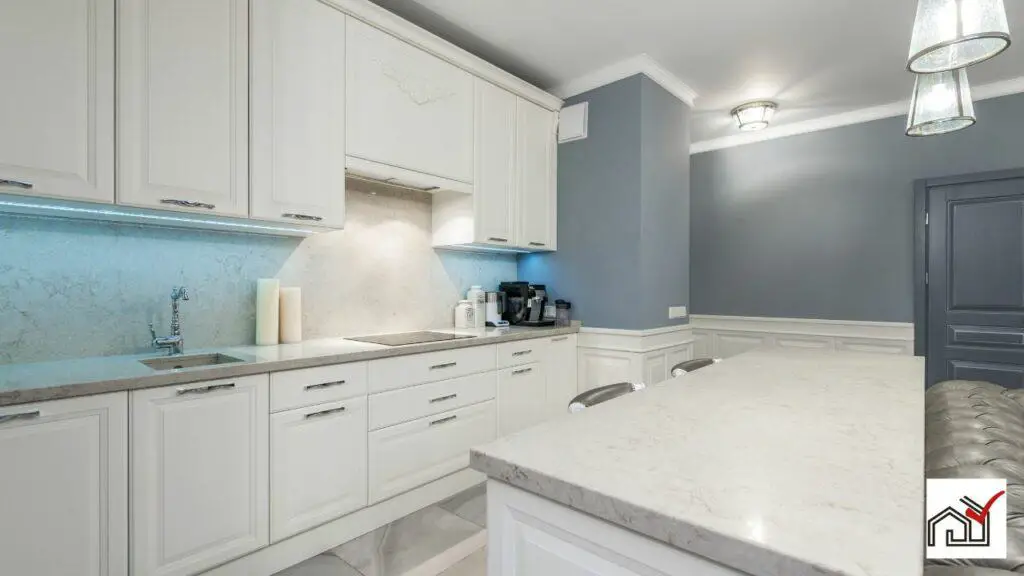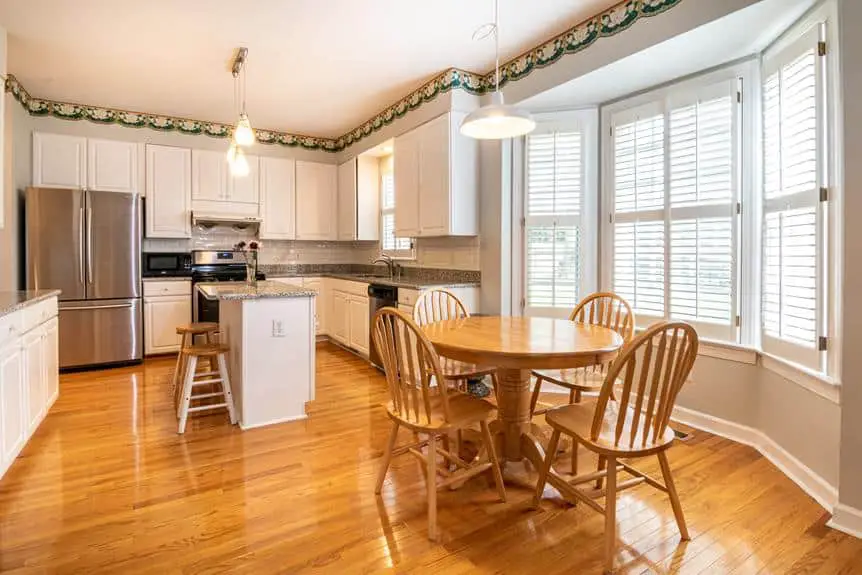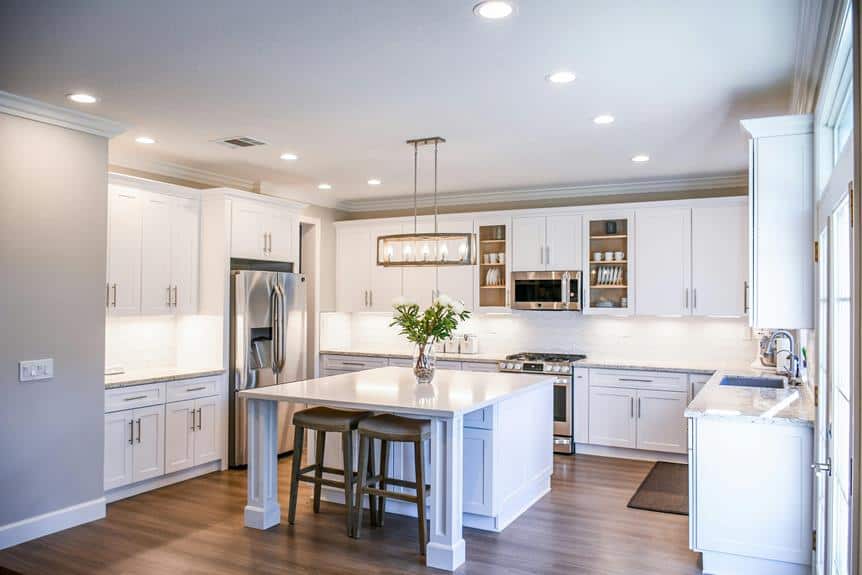If you have been researching countertops for your house, then you must have definitely come across porcelain countertops.
But what are they? What colors do they come in? And should you get one?
We will answer these questions and many more in this guide.
So let’s get started. But first…
What Is Porcelain?
Porcelain is a ceramic material.
Its composition can vary depending on who is manufacturing it and for what purpose.
However, it’s usually made by first mixing White China Clay (Kaolin) with other substances like China Stone, Feldspar, Bone Ash, Ground Glass, Quartz, etc.
This mixture is then heated at very high temperatures, usually 2200°F to 2600°F, to make porcelain.
Porcelain can come in different shapes and colors.
And it’s often used to make dinnerware and decorative items.
It’s also used to make countertops for kitchens and bathrooms because it’s strong and looks nice.
What Exactly Are Porcelain Countertops?
Porcelain countertops are made from a mixture of White China Clay (Kaolin) and China Stone.
The mixture is then heated at around 2600°F to form dense material slabs.
These slabs are then coated with pigmented glazes to create porcelain countertops in various colors and patterns.
Once the glaze is applied, the countertop is heated again so that the glaze attaches to the countertop completely.
How Do Porcelain Countertops Look?
Here are some images of porcelain countertops.


What Colors Do Porcelain Countertops Come In?
Porcelain countertops come in literally thousands of colors and patterns.
Every manufacturer gives different names to the colors and patterns of its porcelain countertops.
The standard colors that porcelain countertops come in are:
- White,
- Grey,
- Beige,
- Brown,
- Black,
- Copper, and
- Ivory.
Pros of Porcelain Countertops
Here are some of the pros of porcelain countertops.
1. High Durability (Chemical Resistant)
When it comes to durability, porcelain countertops get high marks.
Not only are they close to natural stone in terms of hardness, but their tough structure makes them scratch resistant too.
This means you don’t have to worry about your knives damaging the surface while you are cooking.
They also prevent everyday scratches and are nearly bulletproof when it comes to stains because of their lack of porosity.
All in all, if you want a countertop that can take all kinds of wear and tear without getting damaged, then a porcelain countertop is perfect.
2. Stain-Proof
Porcelain countertops are known for their stain-resistant quality.
While no surface is completely resistant to staining, porcelain countertops come really close.
Their non-porous surface doesn’t absorb liquids.
So any potential stains are usually just on the surface and easy to clean.
Moreover, porcelain countertops go through an extreme heating process during their manufacturing.
This helps to seal off any pores in the porcelain slabs, giving them superior protection against potential staining.
They are also resistant to most chemicals and don’t get damaged by acidic foods or drinks, unlike marble countertops.
Related Reading: Are Marble Countertops Durable? (5 Things that Can Ruin Them)
3. Heat-Resistant
Porcelain countertops can easily handle extreme heat without getting damaged, thanks to the high fabrication temperatures that they go through during manufacturing.
No matter what you keep on them, like hot pans and pots, you can be rest assured that they will remain safe and unscathed.
Porcelain countertops won’t scorch or get dark marks like other surfaces.
4. UV-Resistant
Porcelain countertops are resistant to ultraviolet (UV) radiation.
So they don’t fade or lose color even when they are exposed to direct sunlight.
This is particularly useful because some countertops, like marble, can react to extreme sunlight and start to fade over time.
Porcelain countertops can withstand heat, cold, and moisture that other countertops may not be able to.
This makes them an excellent choice for almost all areas of the house.
With a porcelain countertop, you never have to worry about discoloration because it will keep looking beautiful no matter what.
5. Scratch-Resistant
Porcelain countertops stand out from the rest when it comes to scratch resistance.
They are as tough and reliable as granite and quartz countertops in this category.
However, beware of ceramic knives. These knives can sometimes leave scratches on porcelain countertops.
So while using knives to prepare your meals on a porcelain countertop, use a chopping board made of hard plastic or wood.
This will protect your porcelain countertop against any potential risks of scratching.
But all in all, porcelain countertops are scratch-resistant to a large extent.
Further Reading:
- Porcelain Vs. Quartz Countertops: 10 Key Differences
- Porcelain Vs. Granite Countertops: 8 Key Differences
Cons of Porcelain Countertops
Porcelain countertops are very useful, but they have some drawbacks that you should be aware of.
1. Design Patterns Are Printed on The Countertop
The design patterns on the porcelain countertops are only surface-level.
They are printed on the top and not built into the countertop material.
This means that if you have rounded edges on your countertop, the printed patterns may not be visible on them.
Another thing to keep in mind is that if your porcelain countertop chips, then its interior surface will be of one solid color without any design pattern on it.
That’s why care must be taken while applying an edge to porcelain countertops so that too many layers of its pattern don’t get removed.
Otherwise, the aesthetic of the porcelain countertop will get ruined.
For this reason, mitered and square edges work best on porcelain countertops.
These edges don’t go too deep to scrape away all the design patterns from the countertop.
2. Porcelain Countertops Can Crack
Porcelain countertops can crack under blunt force.
So if you use heavy tools such as hammers or meat cleavers on them, then porcelain countertops can crack.
But it’s worth noting that porcelain countertops rarely crack or scratch compared to other materials.
Even though they are vulnerable to scratches from ceramic knives, many experts rate porcelain just behind a stone in terms of resistance.
These countertops usually crack only when they are being cut, fabricated, or transported before installation.
Further Reading: Porcelain Countertop Costs (Explained for First-Timers)
3. Limited Edge Options
Countertops of other materials, such as solid natural stone or quartz composite, offer almost endless edge options.
However, you’re limited to a couple of edge profiles when it comes to porcelain countertops.
While some basic edge options are available such as round, beveled, and straight, the most common choices are square or mitered edges.
So if you want to get creative with your countertop edges, then you are better off with non-porcelain countertops.





